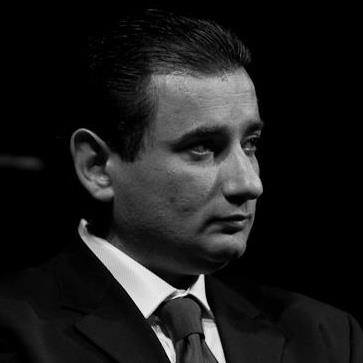About
Vincenzo Napoli was born in 1975 in Sant’Agata di Militello (Messina, Sicily). He lives in Santo Stefano di Camastra (Messina) and he graduated in clarinet under the guidance of Master Vincenzo Cecere with whom he continued marching band instrument studies until 2001.
In 2005 he obtained the Quality Teacher Status cum laude at the Music Conservatory V. Bellini in Palermo, with a thesis entitled: “creativity in music pedagogy”. In 2007 he earned the Quality Teacher Status (Sissis) at the Messina University. In 2009 he achieved a Postgraduate Degree entitled "Theory and methods of multimedia technology use in arts and music teaching in Secondary Schools" at the University of Salento. He was a member of the Navy band and played as clarinetist under the guidance of master Luigi Franco. From 1999 up to date he has taught in different public and private schools, looking after projects concerning the musical area. Today, he is teaching in a college school in Santo Stefano di Camastra. He is registered to the S.I.A.E. in the Music section as a composer. He is the author of numerous compositions for bands, wind orchestras, chamber music groups and many of his compositions have been published by Comar23 and Scomegna .
He received numerous honors and awards: he won the National Composition Competition for unpublished marches for the Holy Week "City of Mottola" (Ta), achieving the 1st place in 2004, the 2nd place in 2005 and 2006 and 3rd place in 2007. He also ranked 2nd in the Fourth International Prize "Giuseppe Sciacca" Chamber Music, Vatican City in Rome. He won the first prize at the V International Prize for “Art Mecenate” music section, City of Arezzo. He also was finalist at the National Competition for Marching band compositions "City of Allumiere" Rome. In December 2018, he won the Bronze medal at the “Global Music Awards” composition competition in La Jolla, California.
His compositions have been performed in Italy and abroad: Spain, Belgium, Greece, Malta, Portugal, Colombia, Guatemala, Russia, etc .. They have been performed, in particular, in Spain by the Municipal Banda de Música of Almeria, that inserted them into a series of concerts in the program of the VI cycle of Sacred Music in 2009. In 2010, moreover, the composition "Almeria" dedicated to the Municipal Banda de Musica de Almeria was performed: the song has been inserted into the 2010 Spring Concert Season that took place at the Theatre "Apolo" of Almeria ; the composition was much appreciated both by the public and by the Italian and foreign press . In 2011 was performed, again by the same band and in the same theater, the composition " Pasodoble de Villa" , included in the 2011 Spring Concert Season . In 2012 the Philharmonic Rossini of Florence executed the composition for wind orchestra "Scene Sinfoniche." The song was included in the Concert Note Tricolori which took place at the Theater della Pergola in Florence. In 2014, was performed a composition for quartet “Serenata Siciliana I” at the Giacomo Puccini Music Conservatory in Gallarate. In 2018, were performed some compositions for harp and for harp and flute at the Santa Cecilia Music Conservatory in Rome: “Risvegli primaverili”, “Nostalgie siciliane” and “Viaggio del gabbiano”. In 2019, were performed the compositions for harp “Risvegli sonori” and “Verso San Pietroburgo” at the St. Petersburg Chamber Opera. In the same year was performed the composition for harp “Inquietudes et Caresses d’amour” at the Salisbury University Maryland
In addition, his compositions have been broadcast by leading international radio stations including: Radio 101 Radiobanda.com in Malta and Spain. He has played in various bands. He has collaborated with various musical associations as a clarinetist and composer; particularly worth mentioning is the collaboration with the Musical Association "G. Verdi" in Sant'Agata di Militello. He composed for the 1st International Symposium of the Horn the song "Horns on the shore", commissioned by Master Luca Benucci, 1st Horn of the Orchestra del Maggio Musicale Fiorentino, performed first in Sant'Agata di Militello; the composition has also received praise from major overseas musicians such as Master Dale Clevenger, 1 Horn of the Chicago Symphony Orchestra.

